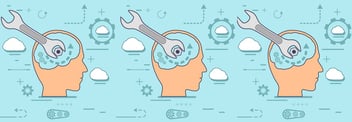The Connection Between Sleep and Mental Health
- Home
- Blog

Reader, have you ever met someone who wears their lack of sleep like a badge of honor? “Oh, I can do just fine on about four hours of sleep a night,” they might say, proudly. I admit, I once felt like my own inability to function without a good six hours of rest made me somehow weak–like I was less strong a person, or lacked the mental resilience that these “genius non-sleepers” apparently possessed.
If you’ve had similar thoughts, please hear me out: When it comes to sleep cycles, these are not the folks you want to emulate! If you strive for the bare minimum of eight hours of sleep a night, you are not weak-willed: you are, in fact, making an investment in both your physical health and your mental health. A good night’s sleep is one of the most beneficial self-care activities we can commit to, and one of the best ways to improve our wellness outcomes for years to come. In this blog, we’ll explore why sleep is so important, how your genes might be impacting your rest, and what you can do about it.
Sleep and Mental Health: Why Catching those ZZZs is Worth It
When it comes to the importance of sleep on your mental health, Matthew Walker, the Director of the Center for Human Sleep Science at UC Berkeley, puts it well: “Every disease that is killing us in developed nations has causal and significant links to a lack of sleep.” A chronic lack of sleep has been associated with memory problems, immune system deficiencies, difficulty concentrating, and even Alzheimer’s disease.
One key reason sleep is so important is that it activates our glymphatic system, our brain’s way of clearing out toxic proteins, cholesterol, and dead brain cell debris. In fact, sleep is the principal “on switch” of this vital system, and the majority of its activity occurs during sleep. When you’re chronically underslept, those toxins and debris build up over time, increasing your risk of developing all manner of chronic illnesses, from obesity to cardiovascular disease to dementia.
Getting enough sleep can add years to your lifespan by slowing your biological clock. Not getting enough, however, can take years away by accelerating the aging of your cells.
Are Your Genes Impacting Your Sleep and Mental Health?
There are many factors, both biological and environmental, that can lead to a chronic lack of sleep. If you regularly can’t get enough shut eye despite giving it your best shot, one of the following genes may be at play:
- CLOCK: Aptly named, your CLOCK gene is specifically involved in regulating circadian activity across a number of biological functions, including metabolism and energy balance. If you possess a “risk” variant on this gene, your circadian rhythms may be slightly dysregulated, leading to a less functional metabolism and other related consequences.
- MEIS1: Certain variants on this gene are strongly correlated with an increased risk of developing Restless Leg Syndrome; those with a G allele have an almost twofold increase in developing the syndrome over time! If RLS keeps you up at night, you and your doctor can discuss options to help mitigate this issue to promote better rest.
- HLA-DQB1: A single variant of this gene is carried in over 90% of individuals with narcolepsy. This is a significant correlation! Narcolepsy is frequently misdiagnosed as depression, schizophrenia, or hypothyroidism, so while this gene is not diagnostic of the condition, it can be an important red flag that narcolepsy is a culprit.
Rest in Peace… or RIP?
Reader, if you take nothing else from this blog, I hope you remember the importance of sleep on mental health outcomes. Genetic testing can help you get to the root cause of your sleep deprivation. Don’t let your chronic lack of sleep ruin your mental health!
.png?width=144&height=144&name=Untitled%20design%20(34).png)



